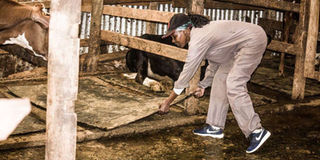Young graduate quits employment to venture into dairy farming

Have you ever imagined resigning from a ‘white collar job’ within the first year when you are fresh from college, to venture into self-employment?
Georgina Chepkoech Rono, 27, did just that. The Egerton University graduate popularly known as ‘dairy-queen’ was not shy to make her hands dirty after resigning from a job where she earned Sh50,000 a month. She had only been employed for a year. Her destination? Dairy farming at Ginah in Nakuru County.
Ms Chepkoech gets 200 litres of milk from her ten Friesian cows per day, earning her more than Sh150,000 a month.
She says each cow produces about 20 litres of milk a day, which she supplies to hotels in Nakuru town and local residents through her milk ATM.
“In a day, I make more than Sh8,000. If I deduct the cost of labour, water and feeds, I get a profit of more than Sh4,000,” she says, adding that in a good month, she makes close to or more than Sh150,000.
Love for animals
Her love for animals pushed her to self-employment and she does not see herself in employment again. Instead, she plans to create opportunities for others.
“I started farming in 2015 immediately after campus, where I studied Animal Health and Production. At that time I was employed, but the decision to venture into commercial farming came in 2016 when I resigned to concentrate on intensive farming. I am passionate about animal keeping,” Ms Chepkoech narrates.
She bought one dairy cow at Sh180, 000 to start her business. She later added three calves at a cost of Sh60,000 each, and they have since grown to produce sufficient milk.
Her initial challenge was how she would survive, having risked quitting her job to start farming with the knowledge that it would take months before she earns any money.
“I bet quitting a job to start your own business takes courage and determination. Some people are so scared of retirement even after they have exhausted their working years,” she says.
Own feeds
Ms Chepkoech makes her own feeds because those sold in most agrovets, she claims, are costly and of poor quality.
“Cost of commercial feed is high for my ten lactating cows, and most of the time the quality is compromised. I, therefore, opt for my own TMR (total mixed ration) which we do in the farm. We plant Boma Rhodes among other protein concentrates, and in case of any surplus, we sell to our neighbours,” she says.
“Nakuru weather is favourable for the farming but sometimes it is very cold, affecting milk production. I thus, use my knowledge in animal health and production to solve the situation.
“I work closely with a veterinary officer to sustain production, and make sure I am up to date with dairy farming information by researching online and attending trade fairs and farmers’ field days,” says Ms Chepkoech.
She has four employees and plans to recruit more as she aims at mechanising her farm. Income from her farming work has enabled her to educate her younger sister.
She is challenging young graduates not to eye office jobs only, but venture into agriculture, which she refers to as ‘unexploited gold’.
Change mind-set
“There is so much wealth in the soil. I would like young graduates to develop a mind-set that the purpose of going to school is not to qualify for employment, but get knowledge for the particular field that interests you.
“I don’t mean people shouldn’t be employed but if you can get enough capital and set up your own venture, it will be great. It is more fulfilling to earn a living from what you love. It comes with so much freedom,” she says.
Ms Chepkoech wants the government to empower the youth through funding their agricultural proposals, arguing that it will help actualise food security, which is one of the tenets of the big four agenda that is at the heart of Jubilee government promises.
“Increase in fuel price affects our deliveries because I use my car and that means I have to dig deeper into my pocket,” Ms Chepkoech says.



